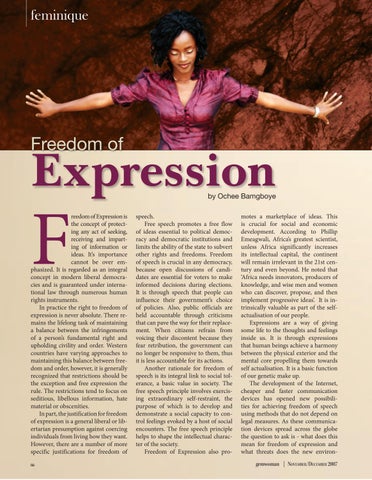feminique
Freedom of
Expression
F
reedom of Expression is the concept of protecting any act of seeking, receiving and imparting of information or ideas. It’s importance cannot be over emphasized. It is regarded as an integral concept in modern liberal democracies and is guaranteed under international law through numerous human rights instruments. In practice the right to freedom of expression is never absolute. There remains the lifelong task of maintaining a balance between the infringements of a person’s fundamental right and upholding civility and order. Western countries have varying approaches to maintaining this balance between freedom and order, however, it is generally recognized that restrictions should be the exception and free expression the rule. The restrictions tend to focus on seditious, libellous information, hate material or obscenities. In part, the justification for freedom of expression is a general liberal or libertarian presumption against coercing individuals from living how they want. However, there are a number of more specific justifications for freedom of 66
by Ochee Bamgboye
speech. Free speech promotes a free flow of ideas essential to political democracy and democratic institutions and limits the ability of the state to subvert other rights and freedoms. Freedom of speech is crucial in any democracy, because open discussions of candidates are essential for voters to make informed decisions during elections. It is through speech that people can influence their government’s choice of policies. Also, public officials are held accountable through criticisms that can pave the way for their replacement. When citizens refrain from voicing their discontent because they fear retribution, the government can no longer be responsive to them, thus it is less accountable for its actions. Another rationale for freedom of speech is its integral link to social tolerance, a basic value in society. The free speech principle involves exercising extraordinary self-restraint, the purpose of which is to develop and demonstrate a social capacity to control feelings evoked by a host of social encounters. The free speech principle helps to shape the intellectual character of the society. Freedom of Expression also pro-
motes a marketplace of ideas. This is crucial for social and economic development. According to Phillip Emeagwali, Africa’s greatest scientist, unless Africa significantly increases its intellectual capital, the continent will remain irrelevant in the 21st century and even beyond. He noted that ‘Africa needs innovators, producers of knowledge, and wise men and women who can discover, propose, and then implement progressive ideas’. It is intrinsically valuable as part of the selfactualisation of our people. Expressions are a way of giving some life to the thoughts and feelings inside us. It is through expressions that human beings achieve a harmony between the physical exterior and the mental core propelling them towards self actualisation. It is a basic function of our genetic make up. The development of the Internet, cheaper and faster communication devices has opened new possibilities for achieving freedom of speech using methods that do not depend on legal measures. As these communication devices spread across the globe the question to ask is - what does this mean for freedom of expression and what threats does the new environgemwoman | November/December 2007













